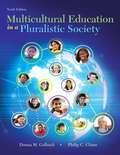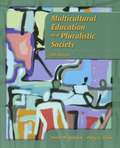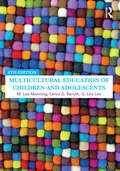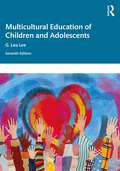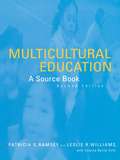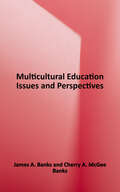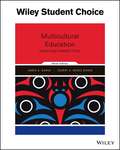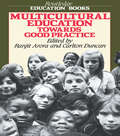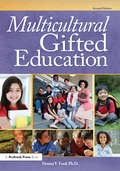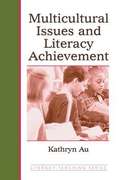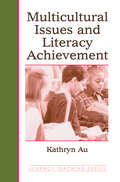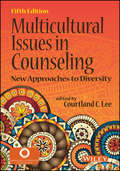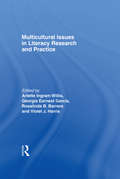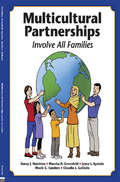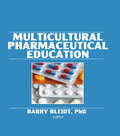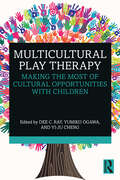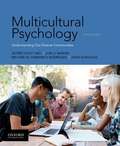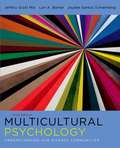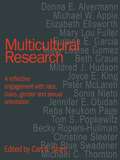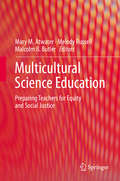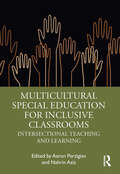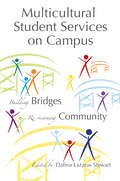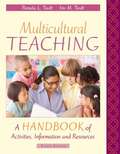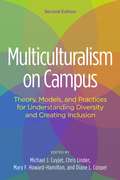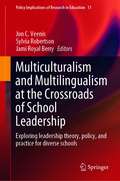- Table View
- List View
Multicultural Education in a Pluralistic Society
by Philip C. Chinn Donna M. GollnickThe tenth edition of Multicultural Education in a Pluralistic Society examines issues of race, diversity and equity in society, how they are reflected in schools, and their impact on students and teachers. In order to explore these issues, the book introduces future teachers to the different cultural groups to which we and our students belong and the importance of building on the cultures and experiences of students to help them learn at high levels.
Multicultural Education in a Pluralistic Society, 6th Edition
by Philip C. Chinn Donna M. GollnickThis well-respected book helps readers understand pluralism and the complexities of cultural backgrounds and how to use this knowledge successfully in the classroom. It appropriately describes seven critical microcultures to which students and teachers belong: class; ethnicity and race; gender; exceptionality; religion; language; and age. These microcultures form the foundation for understanding pluralism and multicultural education. A focus on current issues features sections on hate groups, school violence, social justice, culturally responsible teaching, and teaching for democracy. Video insights incorporated into each chapter promote stimulating social and cultural discussions around video segments from ABC News. For teachers striving to deliver an equitable education to all students.
Multicultural Education of Children and Adolescents
by M. Lee Manning Leroy G. Baruth G. Lea LeeMulticultural Education of Children and Adolescents explores the foundations of diversity through cultural portraits of young people from a variety of backgrounds, and provides practical strategies for shaping and implementing a multicultural curriculum. In Part I, the authors introduce multicultural education as a concept and document the increasing cultural diversity of the United States. The text describes, in Part II, various cultural groups—including African, American Indian, and Hispanic cultures—to help pre-service teachers better understand the backgrounds of diverse learners. Part III focuses on topics that educators should consider when planning and implementing programs that teach acceptance and respect for cultural diversity. Through this series of applied chapters, teacher candidates will learn to use the most effective instructional practices with diverse learners, and to work successfully with families, school personnel, and administrators to implement a multicultural program. Content and features new to the sixth edition include the following: Every chapter opens with a real-life story that introduces the subject matter by showing the ideas in action. Points to Ponder boxes urge readers to reflect more deeply on information they have just read. Additional Case Studies with accompanying Questions for Discussion in all chapters enable nuanced consideration of the crucial differences between culturally specific learning styles. Increased emphasis on Social Justice and White Privilege, including its effects on all people. Chapter 13 has been significantly revised to include increased and updated information on sexual orientation, including transgender students. Chapters in Part II now feature further expanded sections on socioeconomic status and conditions of each ethnic group.
Multicultural Education of Children and Adolescents
by G. Lea LeeMulticultural Education of Children and Adolescents explores the foundations of diversity through cultural portraits of young people from a variety of backgrounds, and provides practical strategies for shaping and implementing a multicultural curriculum.Content and features new to the seventh edition include the following: Every chapter opens with a real-life story that introduces the subject matter by showing the ideas in action Points to Ponder boxes urge readers to reflect more deeply on information they have just read Case Studies with accompanying Questions for Discussion in all chapters enable nuanced consideration of the crucial differences between culturally specific learning styles Chapter 13 now includes a section on teaching and understanding LGBTQIA+ youth, with updated teacher resources to support learning The book addresses newly emerging issues in multicultural education throughout, including discussions around Critical Race Theory, culturally relevant pedagogy (CRP), the impact of the #BlackLivesMatter movement, the impact of xenophobia and hate towards Asian communities during the COVID-19 pandemic, as well as migration and refugee issues Through a series of applied chapters, teacher candidates will learn to use the most effective instructional practices with diverse learners, and to work successfully with families, school personnel, and administrators to implement a multicultural program.
Multicultural Education: A Source Book, Second Edition (RoutledgeFalmer Readers in Education)
by Patricia Ramsey Leslie R. Williams Edwina VoldThe second edition of this source book contains essays and annotations on a number of issues related to multicultural education. The authors define multicultural education as a process-oriented creation of learning experiences that foster an awareness of, respect for, and enjoyment of the diversity of our society and world. Inherent in this definition of multicultural education is a commitment to create a more just and equitable society for all people. This book, then, offers suggestions relevant to the teaching of all children, all teaching and curricular decisions, and every aspect of educational policy.
Multicultural Education: Issues and Perspectives
by James A. Banks Cherry A. McGee BanksAs diversity continues to increase in the United States, ethnic, cultural, social-class, and linguistic gaps are widening between teachers and their students. The rapidly changing educational landscape presents unique challenges and opportunities for addressing diversity both creatively and constructively in schools. Multicultural Education helps current and future educators fully understand sophisticated concepts of culture; become more effective practitioners in diverse classrooms; and view race, class, gender, social class, and exceptionality as intersectional concepts. Now in its tenth edition, this bestselling textbook assists educators in effectively responding to the ways race, social class, and gender interact to influence student behavior and learning. Contributions from leading authorities in multicultural education discuss the effects of class and religion on education; differences in educational opportunities for male, female, and LGBTQ students; and issues surrounding non-native English speakers, students of color, and students with disabilities. Contemporary in relevance, this timely volume promotes multicultural education as a process of school reform. Practical advice helps teachers increase student academic achievement, work effectively with parents, improve classroom assessment, and benefit from diversity.
Multicultural Education: Issues and Perspectives
by James A. Banks; Cherry A. McGee BanksThere is a wide and growing ethnic, cultural, social-class, and linguistic gap between many of the nations teachers and their students. Multicultural Education: Issues and Perspectives, 9th edition, is designed to help current and future educators acquire the concepts, paradigms, and explanations needed to become effective practitioners in culturally, racially, linguistically, and social-class diverse classrooms and schools. An important goal of the 9th edition is to help educators attain a sophisticated understanding of the concept of culture and to view race, class, gender, social class, and exceptionality as interacting concepts rather than as separate and distinct.
Multicultural Education: Towards Good Practice
by Ranjit Arora Carlton DuncanFirst published in 1987. Multicultural Education is designed to emphasise models of good practice tried and tested by teachers in multicultural schools throughout Britain. It describes both the issues of multicultural education and the practical approaches for teachers working in the classroom. The contributors, all experienced in the field, illustrate the ways in which teachers are responding positively to the changing educational needs of multicultural, multiracial and multilingual schools in Britain. The emphasis throughout is on 'starting where the pupils are' and building on what they bring to the classroom.
Multicultural Gifted Education
by Donna Y. FordEach year, the United States witnesses significant changes in the demographics of its citizens. Accordingly, schools—and the students we teach—are also changing. With such changes come the need, responsibility, and obligation for educators to provide students with an education that is both rigorous and culturally responsive. This book bridges the gap that exists between educating advanced learners and educating culturally different learners. Multicultural Gifted Education, 2nd ed. addresses various topics, including racially and culturally diverse students and families, historical and legal perspectives on educating gifted and minority students, culturally responsive curriculum and assessment, and counseling students from a multicultural perspective.
Multicultural Issues and Literacy Achievement
by Kathryn H. AuThis book is a sequel to the author's earlier volume entitled, Literacy Instruction in Multicultural Settings. In addition to extensive updating of earlier material, this book extends the content coverage to include issues of power, attitudes, and systemic change through the application of discourse theory and critical theory. In doing so, however, the author has tried to maintain the brevity, stylistic clarity, and classroom focus of the earlier volume. Key features of this important new book include: *Teaching Flexibility. Although written with the classroom needs of pre-service teachers in mind, theory and research are treated in sufficient depth to make the book suitable for graduate courses and for teacher study groups. *Issues Organization. Each chapter is organized around familiar issues that characterize schools and classrooms with diverse student populations and explores these issues through new lenses that most teachers have not previously encountered. *Social Constructivist Perspective. Critical theory, discourse theory, and historical perspective are introduced in order to sensitize readers to the need to recognize negative, socially sustained patterns that hamper literacy achievement and replace them with positive patterns. To this end each chapter asks students to maintain a running list of negative patterns along with alternative positive patterns.
Multicultural Issues and Literacy Achievement (Literacy Teaching Series)
by Kathryn AuThis book is a sequel to the author's earlier volume entitled, Literacy Instruction in Multicultural Settings. In addition to extensive updating of earlier material, this book extends the content coverage to include issues of power, attitudes, and systemic change through the application of discourse theory and critical theory. In doing so, however, the author has tried to maintain the brevity, stylistic clarity, and classroom focus of the earlier volume.Key features of this important new book include:*Teaching Flexibility. Although written with the classroom needs of pre-service teachers in mind, theory and research are treated in sufficient depth to make the book suitable for graduate courses and for teacher study groups.*Issues Organization. Each chapter is organized around familiar issues that characterize schools and classrooms with diverse student populations and explores these issues through new lenses that most teachers have not previously encountered.*Social Constructivist Perspective. Critical theory, discourse theory, and historical perspective are introduced in order to sensitize readers to the need to recognize negative, socially sustained patterns that hamper literacy achievement and replace them with positive patterns. To this end each chapter asks students to maintain a running list of negative patterns along with alternative positive patterns.
Multicultural Issues in Counseling: New Approaches to Diversity
by Courtland C. LeeWith an emphasis on direct application to practice, this graduate-level text offers strategies for working with diverse client groups in a variety of settings. Introductory chapters build a foundation for cross-cultural counseling with discussions on current theory, the ongoing pursuit of multicultural competence, and the complexities of intersecting identities. Next, 15 chapters designed to help counselors develop their knowledge about and skills with the following populations are presented: African Americans American Indians Arab Americans Asian and Pacific Islanders Economically disadvantaged clients Immigrants Latinx LGBTQ clients Men Military personnel Multiracial individuals Older adults People with disabilities White people of European descent Women Detailed case studies in this section illustrate real-world perspectives on assessment and treatment for an increased understanding of culturally responsive counseling. The final section of the book focuses on ethics and social justice issues. *Requests for digital versions from the ACA can be found on wiley.com. *To request print copies, please visit the ACA website here. *Reproduction requests for material from books published by ACA should be directed to permissions@counseling.org
Multicultural Issues in Literacy Research and Practice
by Rosalinda B. Barrera Arlette Ingram Willis Georgia Earnest García Violet J. HarrisThis volume brings together researchers and participants from diverse groups, reflecting the different ways in which the field of multicultural literacies has been interpreted. A common theme across the chapters is attention to the ways in which elements of difference--race, ethnicity, gender, class, and language--create dynamic tensions that influence students' literacy experiences and achievement. The hope of the editors is that readers will build on the experiences and findings presented so that the field of multicultural literacies will have a greater impact of literacy research, policy, and practice.
Multicultural Partnerships: Involve All Families
by Joyce L. Epstein Mavis G. Sanders Darcy J. Hutchins Marsha D. Greenfeld Claudia GalindoThis is a must-have, research-based guide for all schools serving culturally diverse elementary and middle grade students and their communities. It's filled with fun, practical, highly effective strategies for raising awareness and engaging all families in their children's education — a sure path toward increased student success! Get detailed examples and step-by-step guidelines for implementing successful... Multicultural Family Nights Workshops for Parents Curriculum Connections Much of the reproducible material is also provided in Spanish - giving educators an even broader reach!
Multicultural Pharmaceutical Education
by Barry BleidtMulticultural Pharmaceutical Education spotlights methods and theory on how to increase representation of minorities in pharmacy schools and practice settings. Many of the ideas presented in this book are unique, and all provide an opportunity for institutions with few minority students to greatly improve their recruitment and retention efforts geared toward these students. The contributing authors, representing all levels of academia--deans, undergraduate students, vice provosts, executive directors, a National Professor of the Year, and faculty members--have all had experience in some aspect of minority pharmaceutical education. It is through their practical experiences that they offer suggestions and commentary on pharmacy programs of study. Historical accounts or examples of success that could be emulated at other institutions are included. With the help of Multicultural Pharmaceutical Education, colleges and universities and their faculty can forge ahead in attracting and retaining minority students to their pharmacy programs and into the world of pharmacy practice. Structured around four major areas (foundation, commitment, actuation, and conclusion), the authors remove the option of traditional excuses of failure in this important area of education. All those involved in pharmacy education should read this book whether deans, admissions counselors, professors, or students. Multicultural Pharmaceutical Education provides an easy-to-read, practical and theoretical approach to improving the opportunity and quality of education that minority students can achieve in pharmaceutical programs.
Multicultural Play Therapy: Making the Most of Cultural Opportunities with Children
by Dee C. RayMulticultural Play Therapy fills a wide gap in the play therapy literature. Each chapter helps expand play therapists’ cultural awareness, humility, and competence so they can work more effectively with children of diverse cultures, races, and belief systems. The unique perspectives presented here provide play therapists and advanced students with concrete information on how to broach issues of culture in play therapy sessions, parent consultations, and in the play therapy field at large. The book includes chapters on multiple populations and addresses the myriad cultural background issues that emerge in play therapy, and the contributors include authors from multiple races, ethnicities, cultural worldviews, and orientations.
Multicultural Psychology
by Jeffrey Mio Melanie M. Domenech Rodriguez Lori Barker John GonzalezMulticultural Psychology: Understanding Our Diverse Communities
Multicultural Psychology: Understanding Our Diverse Communities (Third Edition)
by Jeffery Scott Mio Lori A. Barker Jaydee Santos TumambingMulticultural Psychology: Understanding Our Diverse Communities, Third Edition, combines quantitative and qualitative research with anecdotal material to examine an array of multicultural issues and capture the richness of diverse cultures. The text focuses on such compelling topics as differences in worldviews, communication, racial and cultural identity development, racism, and immigration. Other issues covered in the text include gender, sexuality, age, and ability. The authors provide a strong, vivid, and personal voice to the text, richly populating it with anecdotes from themselves, their students, and other contributors, and using them as central points around which to build their case for multicultural issues based on science.
Multicultural Research: Race, Class, Gender and Sexual Orientation
by Carl A. GrantThis is a book at the cutting edge of research on multiculturalism. With contributions from top American authors currently working in this area, the result is a text that not only dissects the multicultural issues facing education in the USA today, but also reveals the methods and procedures of research into this contentious area.
Multicultural Science Education
by Malcolm B. Butler Mary M. Atwater Melody RussellThis book offers valuable guidance for science teacher educators looking for ways to facilitate preservice and inservice teachers'' pedagogy relative to teaching students from underrepresented and underserved populations in the science classroom. It also provides solutions that will better equip science teachers of underrepresented student populations with effective strategies that challenge the status quo, and foster classrooms environment that promotes equity and social justice for all of their science students. Multicultural Science Education illuminates historically persistent, yet unresolved issues in science teacher education from the perspectives of a remarkable group of science teacher educators and presents research that has been done to address these issues It centers on research findings on underserved and underrepresented groups of students and presents frameworks, perspectives, and paradigms that have implications for transforming science teacher education In addition, the chapters provide an analysis of the socio-cultural-political consequences in the ways in which science teacher education is theoretically conceptualized and operationalized in the United States. The book provides teacher educators with a framework for teaching through a lens of equity and social justice, one that may very well help teachers enhance the participation of students from traditionally underrepresented and underserved groups in science, technology, engineering, and mathematics (STEM) areas and help them realize their full potential in science. Moreover, science educators will find this book useful for professional development workshops and seminars for both novice and veteran science teachers. "Multicultural Science Education: Preparing Teachers for Equity and Social Justice directly addresses the essential role that science teacher education plays for the future of an informed and STEM knowledgeable citizenry. The editors and authors review the beginnings of multicultural science education, and then highlight findings from studies on issues of equity, underrepresentation, cultural relevancy, English language learning, and social justice. The most significant part of this book is the move to the policy level--providing specific recommendations for policy development, implementation, assessment and analysis, with calls to action for all science teacher educators, and very significantly, all middle and high school science teachers and prospective teachers. By emphasizing the important role that multicultural science education has played in providing the knowledge base and understanding of exemplary science education, Multicultural Science Education: Preparing Teachers for Equity and Social Justice gives the reader a scope and depth of the field, along with examples of strategies to use with middle and high school students. These classroom instructional strategies are based on sound science and research. Readers are shown the balance between research-based data driven models articulated with successful instructional design. Science teacher educators will find this volume of great value as they work with their pre-service and in-service teachers about how to address and infuse multicultural science education within their classrooms. For educators to be truly effective in their classrooms, they must examine every component of the learning and teaching process. Multicultural Science Education: Preparing Teachers for Equity and Social Justice provides not only the intellectual and research bases underlying multicultural studies in science education, but also the pragmatic side. All teachers and teacher educators can infuse these findings and recommendations into their classrooms in a dynamic way, and ultimately provide richer learning experiences for all students. " Patricia Simmons, North Carolina State University, Raleigh, USA "This provocative collection of chapters is a presentation in gutsiness Ingenious in construction and sequencing, this book will influence science teacher educators by introducing them to is...
Multicultural Special Education for Inclusive Classrooms: Intersectional Teaching and Learning
by Aaron Perzigian Nahrin AzizThis book provides a comprehensive exploration of critical topics in multicultural special education. Filled with case studies, objectives, and summaries to support deeper learning, the chapters discuss privilege and power in K-12 school systems, effective and differentiated instruction, culturally competent IEPs and transition plans, and appropriate assessment. Drawing from seminal multicultural education and culturally sustaining pedagogies, this essential text helps educators develop the skills necessary to affirm and honor identities while meeting the instructional needs of culturally diverse students with disabilities.
Multicultural Student Services on Campus: Building Bridges, Re-visioning Community (An ACPA Co-Publication)
by Dafina Lazarus StewartCo-published with For new professionals in multicultural student services (MSS), this book constitutes a thorough introduction to the structure, organization, and scope of the services and educational mission of these units. For senior practitioners it offers insights for re-evaluating their strategies, and inspiration to explore new possibilities.The book discusses the history and philosophy of MSS units; describes their operation; asserts the need for integration and coherence across the multiple facets of their work and how their role is influenced by the character and type of their institutions; and considers the challenges and opportunities ahead. The theme Building Bridges, Re-Visioning Community reflects the dual role of MSS. They “build bridges” between underrepresented student populations and the broader institutional environment, between different groups of student populations, and across differences in cultural values and traditions. At a time of increasing diversity on campus, their role is also to champion the “re-visioning” or redefinition of what constitutes community in higher education – in other words to reach beyond serving their traditional constituencies to educate for multicultural competence, and advocate for social justice across the campus commons.This book is organized in four sections moving the reader from the past to the present to the future, and from a service mission to an educational one. Part One reviews the purposes for which MSS were created, and the evolution of their vision, concluding an overview of how units perceive their needs and challenges today.Part Two addresses a range of issues – such as race/ethnicity, sexual orientation / gender identity, and religion/faith diversity – commonly addressed by MSS, and, in recognizing the tensions inherent in serving such disparate constituencies, advances ideas for bringing greater integration and coherence to their work.Part Three considers how institutional context influences the structure and organization of MSS, and addresses such questions as: Who are they serving? What kind of support services and educational programming can they provide? How broadly or narrowly should they define their role, and can they extend their influence through alliances with other campus units?The book concludes by looking at how MSS can re-vision community to ensure their continued relevance to the college or university community.An ACPA Publication
Multicultural Teaching: A Handbook of Activities, Information, and Resources (8th edition)
by Pamela L. Tiedt Iris M. TiedtA text for pre-service teachers, also useful for staff development with experienced teachers and administrators. Provides a knowledge base for teaching multiculturally, and gives a wealth of activities that provide learning opportunities for diverse students. Part I details how to infuse multicultural concepts across the curriculum, and Part II tells how to break down stereotypes, explore linguistic diversity, and celebrate multiculturalism throughout the year. Part III discusses problems and issues in multicultural teaching. Includes some 50 pages of recommended readings and resources.
Multiculturalism On Campus: Theory, Models, and Practices for Understanding Diversity and Creating Inclusion (Second Edition)
by Mary F. Howard-Hamilton Diane L. Cooper Michael J. Cuyjet Chris LinderThe first edition of this book constituted a comprehensive resource for students of higher education, faculty, higher education administrators and student affairs leaders engaging with multiculturalism and diverse populations on college campuses. It was one of the first texts to gather in a single volume the related theories, assessment methods, and environmental and application issues pertinent to the study and practice of multiculturalism, while also offering approaches to enhancing multicultural programming and culturally diverse campus environments.
Multiculturalism and Multilingualism at the Crossroads of School Leadership: Exploring leadership theory, policy, and practice for diverse schools (Policy Implications of Research in Education #11)
by Jon C. Veenis Sylvia Robertson Jami Royal BerryThis volume builds upon emergent understandings about educational leadership and policy in hopes of continuing to refine our understanding of what effective leadership means in linguistically and culturally diverse school contexts. The volume seeks to entrench a deeper understanding of the broader leadership policies and practices that promote the success of linguistically and culturally diverse students, while also recognizing that effective leadership can be highly dependent on context. It offers original empirical research that enhances an understanding of the interdependencies between leadership, culture, language, and policy (i.e., the mechanisms that engender or hinder successful stewardship of linguistic and cultural plurality). The confluence of school leadership, linguistic diversity, and multiculturalism makes this volume unique, especially considering the pace at which global migration continues to accelerate, coupled with the need to accommodate an array of diverse learning needs in today’s schools.
